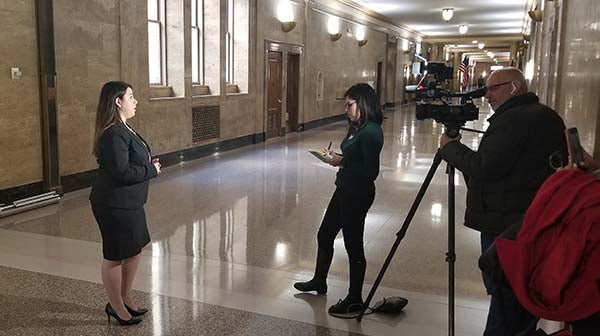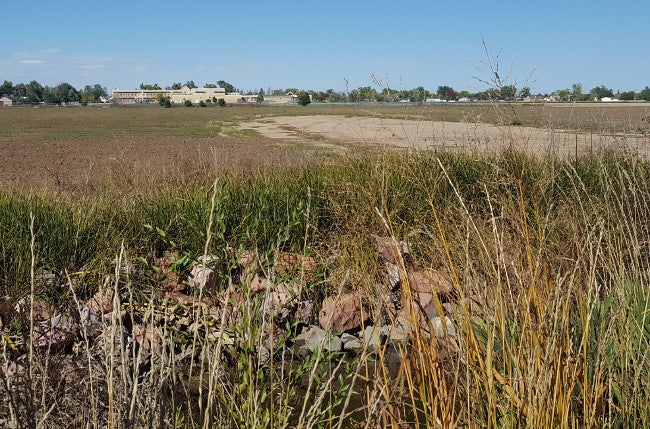Environmental Law Clinic Spring 2018 Updates
ELC Student Attorney Brandy Noriega (l) being interviewed by Univision following oral arguments in a lawsuit challenging the Colorado Oil & Gas Conservation Commission’s approval of the 24-well development directly adjacent to the ballfields and playgrounds of Bella Romero Academy in Greeley, Colorado.
ELC Student Reflection
I am a 4L Student Attorney with the Environmental Law Clinic (ELC). One of the primary reasons I chose to attend the Sturm College of Law was due to the exceptional reputation of the Clinical Programs at the school. Since I began law school, I knew I wanted to participate in the ELC. When I began working with the clinic, I took particular interest in a case in which environmental organizations were opposing a planned oil and gas development which threatened the community’s health and safety by being located next to a middle school. Coming from an underrepresented community myself, and working with others who have not had the same opportunities that I have had, I have a particular interest in helping underserved communities, such as the students that attend Bella Romero Academy.
Moreover, I have learned that when there is a cultural barrier, specifically a language barrier between an underserved community and the majority class, the loss of opportunity to be heard and limited access to justice is further exacerbated due to an inability or even a fear to communicate with representatives of that class. The ELC brought a lawsuit on behalf of Weld Air & Water, Sierra Club, NAACP Colorado State Conference, and Wall of Women challenging a state agency’s permitting of the industrial-scale, 24-well development. Since the beginning of Fall 2017 semester, I have had the privilege of being able to represent these organizations and their members, and give voice to their concerns over the construction of a fracking site less than 1,000 feet from the playgrounds and sports fields of the middle school.
Being a student attorney with the ELC has afforded me the opportunity to do extensive legal research, work on reply briefs, a motion for a preliminary injunction, and a motion for a temporary restraining order under the supervision of Clinical Fellow Tim Estep and Assistant Professor Kevin Lynch. In addition to drafting pleadings and motions, I also presented oral arguments in the Denver District Court in December 2017. The time frame that we had to prepare for oral arguments was brief, yet exhausting. Having only presented a moot oral argument in my 1L year and reading about arguments in texts, I had a lot to learn in a very short period of time. Mooting oral arguments became a daily activity in the final ten days prior to the hearing. I would edit an argument, review, present, and repeat. My supervising attorneys and our clients all participated in giving me constructive criticism as well as encouragement in preparation for the hearing.
From the moment oral arguments were granted until I stood in front of the judge, I was nervous yet determined to advocate for our clients. On the day of the hearing, there was a continuous flow of people entering the court room as we were waiting to begin. There were many people that I knew, as they were our clients. There were many more that I had never met, but I knew they were invested in the outcome of this litigation in one way or another. A lot of people were members of the Bella Romero community, there to provide us with moral support, as well as to be there for one another. After all, this was their day in court. Eventually, I had to stop turning around because I became more nervous knowing how many people were depending on us to advocate for them.
Proposed location for the 24-well development, with Bella Romero Academy in the background.
At the hearing, we pressed two arguments that we had previously briefed: first, that the Colorado Oil and Gas Conservation Commission violated state law when it approved the permits for the development because the agency ignored numerous health studies that discuss the dangers of placing oil and gas developments so close to residential homes and schools; and second, that the Commission’s approvals were arbitrary and capricious in light of the administrative record and state regulations.
Perhaps most importantly, we pointed out the environmental injustice taking place at Bella Romero. Environmental justice can be defined as a movement to ensure that all people receive the same environmental protection under the law regardless of their race, color, national origin, or income. Although this was not a substantive argument that we raised in briefing, it holds extraordinary significance to our clients. When the permittee was applying for approval of the development from the Commission, it came out that they had previously targeted the development near a school that had a predominantly white student population with a higher average household income, in comparison to Bella Romero, which is a predominantly Hispanic school with a lower average household income. After receiving backlash from the community surrounding the other school, the permittee looked elsewhere. It eventually settled on a site next to Bella Romero and have since been determined to construct their operations there, regardless of the environmental justice issues along with general concerns about health impacts that were raised by the community about putting a fracking site so close to so many people.
After the conclusion of arguments, I was interviewed in Spanish by Univision, a Spanish television broadcaster. I discussed the arguments that we raised at the hearing. The reporter focused on asking me to describe why we were arguing that it is unlawful, as well as environmentally unjust, to put an oil and gas development next to Bella Romero, and how the community will be adversely-affected by fracking operations that could take place at this site. This was an incredible opportunity that I had to speak to a community and make them aware of what was about to happen just a few hundred feet from where many of their children play outside while at school. I was able to stay in my “lawyer shoes” and discuss litigating the case while also being able to express the concerns of our clients that they had been sharing with us since we took the case on.
Looking back on experiences I have had in ELC, they have been invaluable. I have learned a lot both in academic and practical terms about how to be an attorney. I’ve learned the real effect that the law and governmental decisionmakers have on the lives of people who are governed by them. I intend to take the experiences I have had with the ELC and use the lessons I learned in order to be an ever-improving advocate for my clients when I am a practicing attorney.
—Brandy Noriega, 4L




